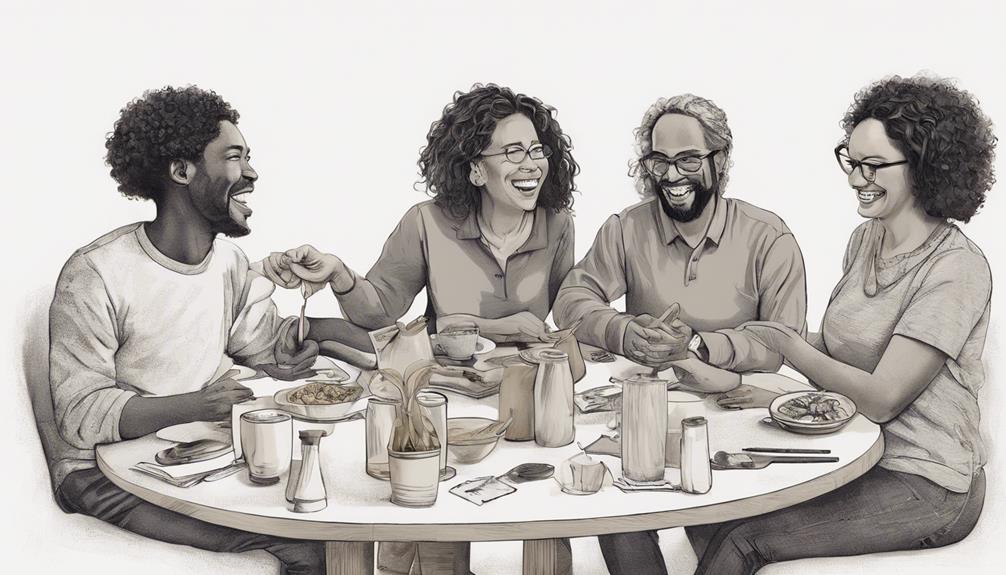In a society where having children is often considered the norm, the childfree choice movement is making waves by challenging traditional views on parenthood.
But what exactly propels individuals to veer off this well-trodden path? The reasons are as varied as the people themselves.
From redefining notions of success to concerns about the planet's future, each motivation offers a unique glimpse into the complex tapestry of reasons behind this increasingly prevalent decision.
Key Takeaways
- Rejecting societal pressure and expectations surrounding parenthood.
- Pursuing career advancement, personal development, and individual goals.
- Contributing to environmental sustainability by reducing carbon footprint.
- Enjoying financial freedom, autonomy, and personal control without children.
Societal Norms and Expectations

In modern society, societal norms and expectations often dictate that individuals should have children to fulfill their roles. This pressure can come from various sources, including family, friends, and even the media. The idea that parenthood is a critical part of one's identity is deeply ingrained in many cultures, leading to the belief that having children is a natural progression in life.
These societal expectations can create a sense of obligation for individuals to have children, whether they truly desire parenthood or not. The pressure to conform to these norms can be overwhelming and may lead individuals to make decisions that aren't in line with their true desires and aspirations.
Moreover, the assumption that everyone wants or should have children can be exclusionary and dismissive of those who don't wish to become parents. It's essential to recognize that choosing not to have children is a valid and legitimate decision that should be respected and supported by society as a whole.
Career and Personal Fulfillment

Society often emphasizes the importance of balancing one's career and personal fulfillment, which can significantly influence an individual's decision regarding parenthood. Many of us are focused on achieving professional success and personal growth, dedicating time to our careers, hobbies, and passions. The pursuit of these goals can be all-consuming, leaving little room for the additional responsibilities that come with raising children.
For some, the decision to remain childfree is driven by the desire to prioritize their careers and personal fulfillment. Without the obligations of parenthood, individuals can dedicate more time and energy to advancing in their professions, pursuing higher education, traveling, or engaging in activities that bring them joy and satisfaction. The choice to forgo having children allows individuals the freedom to structure their lives in a way that aligns with their personal goals and values.
Ultimately, the pursuit of career and personal fulfillment is a valid and significant factor in the childfree choice movement. It reflects a desire for autonomy and self-fulfillment that resonates with many individuals in today's society.
Environmental Concerns

Considering the impact of our choices on the environment is a crucial aspect of the childfree choice movement. By choosing not to have children, we can significantly reduce our carbon footprint. The decision to go childfree means fewer individuals consuming Earth's finite resources and producing waste. Research shows that having a child has a substantial environmental impact, with estimates indicating that each child adds the carbon equivalent of 58.6 tons of CO2 to a parent's carbon legacy.
Furthermore, raising a child increases household energy consumption, water usage, and waste production. By opting out of parenthood, we can contribute to a more sustainable future for the planet. This choice aligns with our values of environmental stewardship and responsibility. It allows us to minimize our contribution to climate change and ecological degradation. For those of us who prioritize the health of the planet, the childfree lifestyle offers a meaningful way to live in harmony with our environmental beliefs.
Financial Stability

Examining the economic implications of choosing not to have children reveals the significant impact on financial stability. For many of us, financial stability plays a crucial role in our decision to remain childfree. Here are some key points to consider:
- Increased disposable income: Without the financial responsibilities of raising children, we often have more disposable income to invest in our own goals and desires.
- Career advancement opportunities: Being childfree can provide us with the flexibility to pursue career advancement opportunities that may require extra time and dedication.
- Retirement planning: Planning for retirement becomes more straightforward without the added expenses of raising children, allowing us to focus on building a secure financial future.
- Freedom to travel: Without the financial burden of supporting a family, we've the freedom to indulge in travel and exploration, enriching our lives in different ways.
- Emergency savings: Being childfree can enable us to build up a robust emergency savings fund, providing a sense of security and stability in times of unforeseen financial challenges.
Autonomy and Control

With autonomy and control being central to the childfree choice movement, individuals without children often prioritize personal freedom and decision-making power over their own lives. This emphasis on autonomy stems from a deep-seated desire to shape one's life according to personal values and goals, without the constraints that children can sometimes bring. By choosing not to have children, these individuals maintain control over their time, finances, and overall lifestyle choices.
For many in the childfree community, autonomy isn't just about making decisions for oneself; it's also about retaining the ability to adapt to life's uncertainties without being responsible for the well-being of dependents. This freedom allows childfree individuals to pursue their passions, career goals, travel aspirations, and personal growth without the limitations that parenting responsibilities may impose.
Ultimately, the childfree choice movement champions the idea that autonomy and control are essential components of a fulfilling life. By actively choosing to remain childfree, individuals assert their right to live on their terms, prioritizing self-determination and personal fulfillment above societal expectations.
Frequently Asked Questions
How Do Family and Friends Typically React to Someone's Decision to Be Childfree?
When someone decides to be childfree, family and friends can react in various ways. Some may be supportive and understanding, while others might struggle to accept the choice.
It's common for initial reactions to range from surprise to disappointment. Open communication and mutual respect are crucial in navigating these conversations.
Ultimately, how family and friends react to this decision can vary greatly depending on individual beliefs and values.
Are There Any Specific Cultural or Religious Factors That Influence the Childfree Choice Movement?
In various cultures and religions, beliefs about family, reproduction, and societal roles can greatly impact the choice to be childfree. These factors often intertwine with personal values, societal norms, and historical perspectives to shape individuals' decisions.
From cultural expectations to religious teachings, the complex tapestry of influences can both support and challenge those who opt for a childfree lifestyle. Understanding these intricate connections is crucial in comprehending the diverse motivations behind the childfree choice movement.
What Impact Does Being Childfree Have on One's Social Life and Relationships?
Being childfree can impact one's social life and relationships in various ways. It can provide more freedom to pursue personal interests, travel, and focus on career goals.
However, it may also lead to some social isolation or strained relationships with friends and family who have children.
How Does the Childfree Choice Movement Address the Issue of Aging and Care in Later Life?
As we explore the childfree choice movement's stance on aging and care in later life, it becomes evident that the movement emphasizes personal autonomy and the ability to make decisions based on individual needs and desires.
This approach acknowledges the importance of planning for one's future without relying on traditional familial structures. It promotes alternative support systems and encourages discussions on aging with dignity and independence.
Are There Any Health or Medical Reasons That Individuals May Choose to Be Childfree?
There are various health and medical reasons why individuals may choose to be childfree. Some may have underlying health conditions that make pregnancy risky, while others prioritize their mental health and well-being.
Additionally, some individuals may be concerned about passing on genetic disorders or conditions to their offspring. Ultimately, personal health considerations play a significant role in the decision to remain childfree.
What Are the Reasons Behind Choosing to Be Childfree?
There are various drives behind childfree movement. Some individuals value their freedom and independence, choosing to prioritize their careers, hobbies, and personal development. Others cite environmental concerns and the desire to minimize their carbon footprint. For many, the decision to be childfree is a deeply personal one driven by complex factors.
Conclusion
In conclusion, the childfree choice movement is driven by a combination of societal norms, personal fulfillment, environmental concerns, financial stability, and autonomy.
Like a river flowing steadily towards the sea, individuals are carving out their own paths free from traditional expectations.
As we continue to explore and understand the reasons behind this movement, we're able to appreciate the diverse perspectives and motivations that shape our society.









